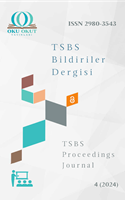Oryantalist Theodor Nöldeke ve Friedrich Schwally’in ‘Kur’an Tarihi’ Adlı Çalışmalarında İslam’a Dair Görüşlerin Karşılaştırılması
Comparison of the Views on Islām in Orientalist Theodor Nöldeke and Friedrich Schwally’s ‘History of the Qur’ān’
Author(s): Hasan Yıldız, Muhammet Hanefi PalabıyıkSubject(s): History of Islam, Contemporary Islamic Thought, Sociology of Religion, History of Religion, Qur’anic studies
Published by: Oku Okut Yayınları
Keywords: History of Islam; Islam; Qurʾān; Origins of Islam; Orientalist; Schwally;
Summary/Abstract: In the last two centuries, there has been a significant increase in the works of orientalist researchers on Islām and its origins. We observe that many researchers have put forward different and new claims on these issues. This study analyses Friderich Schwally’s claims about the origin of Islām in comparison with Theodor Nöldeke’s views. Schwally was one of the first important orientalists to work in the field of Qurʾānic studies. Nöldeke started to write a large-scale history of the Qurʾān, but could not complete it due to his illness, and Schwally, as his student, continued his work and completed only the first two volumes. An examination of this work, which Schwally also failed to complete, reveals that his views on the origins of Islām differed significantly from those of his teacher. Nöldeke accepts the Prophet’s prophethood, albeit slightly differently, and believes that he received revelation but also intervened in the content of the Qurʾān. In addition, he also accepts that al-Ḥurūf al-Muḳaṭṭaʿa was written for copy determination and that there may be an excess or deficiency of verses in the Qurʾān. Schwally makes some claims about the time of Abu Bakr to show his doubts about the collection, reproduction, and content of the Qurʾān. For example, according to him, the fact that the collection of the Qurʾān was due to the death of the companions who had memorized the Qurʾān after the battle of Yemen is enough to cast doubt on the Qurʾān. He also claims that Zayd b. Thabit inserted the al-Ḥurūf alMuḳaṭṭaʿa in the Qurʾān to show from which Mushaf the suras were taken. Again, Schwally analyzes the history of the Qur’ān as well as its content, claiming that Islām is not original, but has emerged from the borrowing of certain doctrines and beliefs from past religions and belief systems. His entire effort is to prove that Islām is an invented, manufactured, and stolen religion. In light of Schwally’s claims, our study aims to show the difference between the two Orientalists’ approaches to the origins of Islām. In order to do so, a qualitative and historical comparative method will be used to show how they differ from each other.
Journal: TSBS Bildiriler Dergisi
- Issue Year: 2024
- Issue No: 4
- Page Range: 223-234
- Page Count: 12
- Language: Turkish

